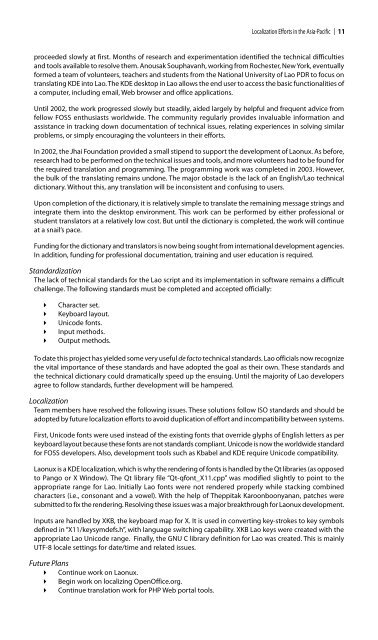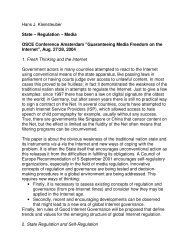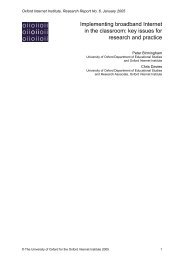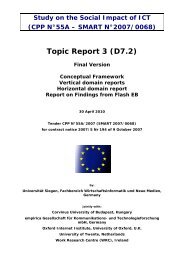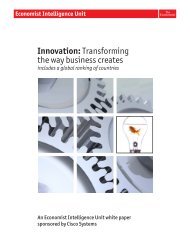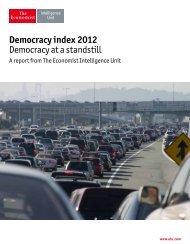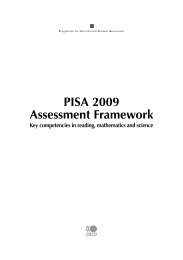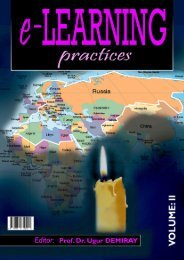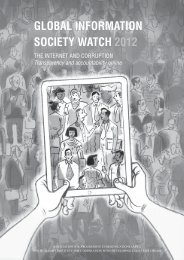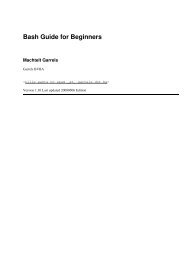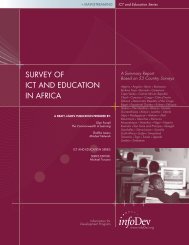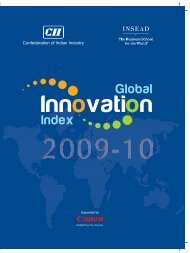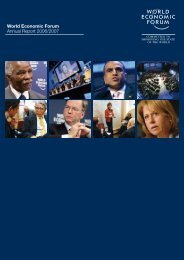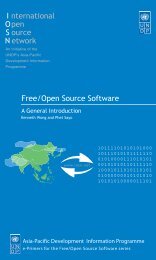Create successful ePaper yourself
Turn your PDF publications into a flip-book with our unique Google optimized e-Paper software.
Localization Efforts in the Asia-Pacific ❘ 11proceeded slowly at first. Months of research and experimentation identified the technical difficultiesand tools available to resolve them. Anousak Souphavanh, working from Rochester, New York, eventuallyformed a team of volunteers, teachers and students from the National University of Lao PDR to focus ontranslating KDE into Lao. The KDE desktop in Lao allows the end user to access the basic functionalities ofa computer, including email, Web browser and office applications.Until 2002, the work progressed slowly but steadily, aided largely by helpful and frequent advice fromfellow FOSS enthusiasts worldwide. The community regularly provides invaluable information andassistance in tracking down documentation of technical issues, relating experiences in solving similarproblems, or simply encouraging the volunteers in their efforts.In 2002, the Jhai Foundation provided a small stipend to support the development of Laonux. As before,research had to be performed on the technical issues and tools, and more volunteers had to be found forthe required translation and programming. The programming work was completed in 2003. However,the bulk of the translating remains undone. The major obstacle is the lack of an English/Lao technicaldictionary. Without this, any translation will be inconsistent and confusing to users.Upon completion of the dictionary, it is relatively simple to translate the remaining message strings andintegrate them into the desktop environment. This work can be performed by either professional orstudent translators at a relatively low cost. But until the dictionary is completed, the work will continueat a snail’s pace.Funding for the dictionary and translators is now being sought from international development agencies.In addition, funding for professional documentation, training and user education is required.StandardizationThe lack of technical standards for the Lao script and its implementation in software remains a difficultchallenge. The following standards must be completed and accepted officially:Character set.Keyboard layout.Unicode fonts.Input methods.Output methods.To date this project has yielded some very useful de facto technical standards. Lao officials now recognizethe vital importance of these standards and have adopted the goal as their own. These standards andthe technical dictionary could dramatically speed up the ensuing. Until the majority of Lao developersagree to follow standards, further development will be hampered.LocalizationTeam members have resolved the following issues. These solutions follow ISO standards and should beadopted by future localization efforts to avoid duplication of effort and incompatibility between systems.First, Unicode fonts were used instead of the existing fonts that override glyphs of English letters as perkeyboard layout because these fonts are not standards compliant. Unicode is now the worldwide standardfor FOSS developers. Also, development tools such as Kbabel and KDE require Unicode compatibility.Laonux is a KDE localization, which is why the rendering of fonts is handled by the Qt libraries (as opposedto Pango or X Window). The Qt library file “Qt-qfont_X11.cpp” was modified slightly to point to theappropriate range for Lao. Initially Lao fonts were not rendered properly while stacking combinedcharacters (i.e., consonant and a vowel). With the help of Theppitak Karoonboonyanan, patches weresubmitted to fix the rendering. Resolving these issues was a major breakthrough for Laonux development.Inputs are handled by XKB, the keyboard map for X. It is used in converting key-strokes to key symbolsdefined in “X11/keysymdefs.h”, with language switching capability. XKB Lao keys were created with theappropriate Lao Unicode range. Finally, the GNU C library definition for Lao was created. This is mainlyUTF-8 locale settings for date/time and related issues.Future Plans Continue work on Laonux. Begin work on localizing OpenOffice.org. Continue translation work for PHP Web portal tools.


